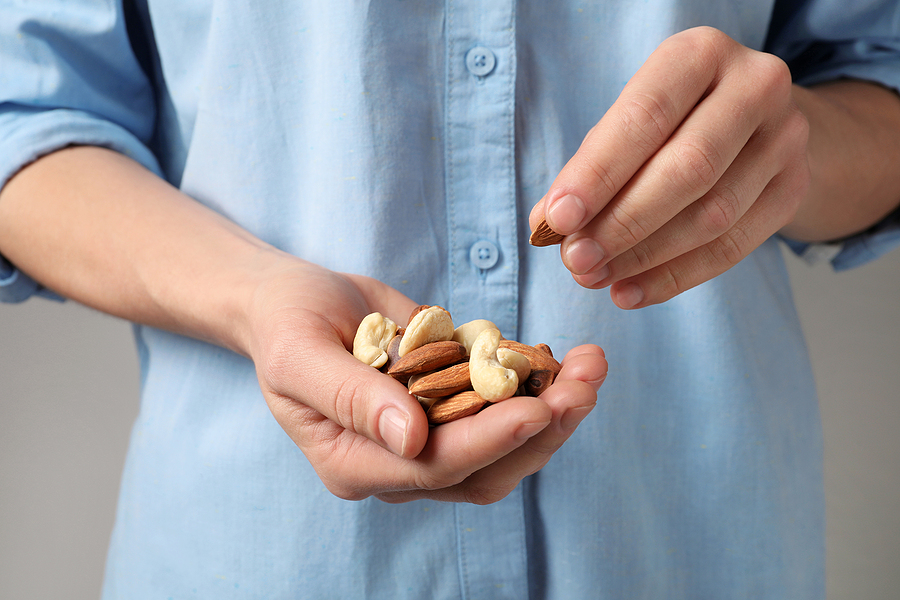Updated 7/18/2021
The single biggest topic of conversation in my office is weight.
Clients come to me frustrated, confused and overwhelmed. Many have no idea how to even determine what a healthy weight for them is! Society has muddied the water here, in more ways than one.
When you look at media images, you might believe that only the rail thin can be considered healthy. On the flip side, clothing and pattern sizes have been altered so it’s hard to know exactly what size you’re actually wearing.
What used to be called a size eight is sometimes labeled a four, and when you buy patterns instead of ready to wear clothing, you often need a much bigger size.
Add to that the tendency for well-meaning professionals to tell women they have to “love their bodies” no matter what, and it’s easy for a woman who is truly not very healthy to fool herself into thinking she’s fine.
Make no mistake, I think it’s essential for women to love themselves, no matter their size. But when someone is avoiding mirrors and refusing to have her picture taken, she’s not really loving her body no matter what she’s saying.
Media images can also swing weight too far in the other direction — and being underweight can cause as many health problems as being overweight can.
But far more often, I’m hearing for women who are concerned with their weight – whether they have ten pounds or more than 100 to lose. As a consequence, they add any number of extreme unhealthy patterns over the course of their lifetimes to keep things “in check.”
The truth is that bodies have a comfortable set point, but it’s not necessarily what we think it is. But when weight continually fluctuates up and down no matter how you eat or what other health markers indicate, it’s a signal that something isn’t working right.
It can be a red flag telling you you’re under physical or emotional stress of some kind — stress you might not even recognize! It could be something as simple as having too little time to eat regular meals, or it could be years of small imbalances piling up in your body until some added stress puts you over the top — it’s different for everyone.
Love yourself enough to know what truly healthy looks like
As I said before, the “love your body” movement has gone too far. There’s enough research out there to show that obesity is an important marker for major health problems, including heart health which is the number one killer of women in the US.
That said, it’s vital to remember that no one factor tells us the whole story. And some factors, like genetics, are out of our control. It’s important to focus on the things we can control rather than obsessing on those we can’t do anything about.
That’s why a functional medicine approach — looking at the whole person — is so important. Charts and calculators won’t tell the whole story, and BMI is just one (sometimes controversial) risk factor. In short, it’s a great starting point, but there’s so much more to think about.
For instance, a woman who is 5’4” and weighs 160 pounds may be nearing the obesity marker on the charts, the risks of health problems are much higher if she eats fast food daily, rarely exercises, and has a desk job. If she eats primarily organic whole foods, has a regular exercise routine, and spends most of her work day on her feet, the outlook is quite different.
We have to look at the whole range of health markers to assess risk. That’s why functional medicine is so helpful. We believe that the more information we have, the more help we can be.
I’ll recommend genetic testing, blood pressure monitoring, blood tests to measure blood sugar levels and inflammatory markers, and anything else that will give me the information I need to help a woman help herself.
If emotional factors are at play, it’s essential for women to change their mindset. Whether you look in the mirror and see yourself as “too much” or “too little,” obsessing about the extra curves (or the lack of them) can be a major obstacle to finding your healthy weight.
Busting the myth
There’s another big hurdle to overcome: the long held myth that “calories-in, calories-out” is the only recipe for success when it comes to weight.
Women who struggle with issues of unexpected weight change (whether it’s gain or loss) may intuitively know that something is out of balance in their bodies, but may not “hear” what their bodies are telling them over the oft repeated social messages that say weight is all about what we eat. Often, they even hear this message from their doctors!
What could be more frustrating than knowing you’re counting every calorie only to hear a trusted professional tell you it’s all your fault?
So often, we hear that if we’re gaining weight, it’s because we don’t have enough will power, or we aren’t trying hard enough, or we’re lying to ourselves about how much we’re actually eating. If we’re thin, people insinuate that we must have some kind of eating disorder (even as women who are every bit as thin are celebrated for their beauty on magazine covers).
Blocking out media messages can be exceedingly difficult, so one of the things I often tell women who are struggling with weight issues is to turn off the TV, stay off social media, and stop reading fashion magazines. So much of what we see online or in print advertising simply isn’t real life!
When we take a breather from the constant input, we can notice the things we love about ourselves instead of comparing ourselves to impossible to attain imagery.
It’s not really even about your body — it’s about years of hearing that we aren’t good enough. So the first step in making strides towards achieving a healthy weight may well be to address this core belief. Try to write down one thing you love and are grateful for every day.
Do you have the strength to pick up your child? Or the ability to dance when your favorite song comes on? Did you go a whole week without eating sugar? Celebrating the baby steps allows you to continue the journey instead of giving it up as hopeless.
How stress impacts weight
If you’re too stressed for too long, your body will hold onto weight or drop it quickly.
Our bodies often hold extra weight when something is wrong — it’s a built-in protection that we evolved to ensure survival. Among our ancient ancestors, long-term stress was often related to scarcity of good food, so the body’s response to store energy as fat could be life-saving.
In the modern world, survival isn’t usually an issue, but our bodies still react as if it is. Ironically, this “life preserver” can, over the long run, threaten our health — we’ve all heard the long litany of diseases related to excess weight.
On the other end of the spectrum are the women whose core imbalance doesn’t show up in excess weight but in an unhealthy level of thinness. The body does whatever it needs to in order to maintain homeostasis, and these women are often carrying such high levels of stress, worry, and adrenal overload that they burn up everything they take in.
Overly thin women struggle to provide their bodies enough nutritional support to build muscle, keep their bones strong and healthy, and fight off infections. It’s sad, but true, that these women are just as unhealthy – maybe even more so – than women carrying too much weight.
Healthy Weight Is About Finding Balance
We can hold extra weight — or be unable to gain weight — during periods of hormonal imbalance, adrenal fatigue, digestive disorders, neurotransmitter imbalances, toxicity, and inflammation, just to name a few.
Weight gain or loss can also be related to imbalance in our life choices. Exercising too much or too little, over — or under — emphasizing specific food groups so that we don’t have a balanced diet — even imbalances in our relationships or emotional lives can affect our weight!
Whether your goal is to lose weight or gain it, a key starting point is to recognize where your life and health are out of balance. Once you find and heal your core imbalance, your body weight will stabilize at the level that is comfortable for your body.
Below are some more tips for either losing or gaining weight to get you started on the path towards loving the body you live in.
Tips on healthy weight loss
Fill your body with nutrients it can use well.
Although weight loss is not all about calories, the type of calories you consume does matter. If you eat nothing but chips and chocolate, your body will respond accordingly. It just can’t send the right messages to keep things functioning smoothly.
Knowing about hidden food sensitivities is also crucial to success. If you’re eating something your body can’t process (no matter how healthy it is for others) it’s unlikely you’ll be able to meet your goals.
Whole natural foods are your best bet for helping your body process food efficiently. A high quality multivitamin/mineral complex can also help ensure you aren’t deficient in any essential nutrients. Don’t forget to stay well hydrated, too!
Exercise Regularly (but don’t overdo it).
Staying active is essential to good health, and regular exercise has been shown to help with weight control in conjunction with a healthy diet. But you don’t have to train for a marathon or go to a gym every day for hours to get results. In fact, for many women, that might make it harder to lose weight because of the stress it puts on your body.
I suggest that women get some form of exercise at least four times a week. The caveat is, it has to be something they love! All movement counts – so if you’re playing tag with your child, you’re exercising!
If you already have a good exercise routine, try adding a few “bursts” of top energy output throughout your workout for maximum impact.
Don’t neglect the emotional aspects of weight.
So much of how women feel about their body is tied up in emotional health.
Many of us got the message as children that food was a great source of comfort. We turn to familiar (usually unhealthy) comfort foods instead of really dealing with the feelings we’re having. Emotional eating is a major factor in many women’s inability to maintain a healthy weight.
On the flip side, emotions can also have a lot to do with why some women don’t eat enough. Particularly when it feels like you can’t control anything, having the ability to decide what you put into your body (or don’t) can be powerful.
Reserve time to relax every day.
Some women let the frenzy of daily life consume them, constantly giving to others from the moment they get up until they fall into bed exhausted. It may seem like there’s no choice sometimes, but the truth is you CAN find time for yourself.
Schedule it in the calendar like any other appointment. Your body needs adequate sleep (at least 8 hours per night) to rejuvenate. And it also needs time to pause and just breathe, enjoy the moment you’re in, and release pent up stress.
Invest in testing to find the best diet for YOU.
Genetic testing can make a big difference in finally realizing how you need to eat to keep your body healthy and strong. You are genetically programmed to be able to maintain a healthy weight by eating either low-fat, low-carb, or a combination of the two.
And it’s impossible to know which without the tests! So many women I know (myself included) have struggled for far too long because they simply weren’t giving their bodies the right fuel.
Tips on healthy weight gain
There’s so much information out there about what to do if you want to lose a few pounds. But I know that women who have trouble gaining weight can suffer just as much as those who can’t lose.
Pay attention to when you eat and drink.
Being underweight can lead you to feel full more quickly, so instead of trying to eat three larger meals per day, break it up into five or six smaller ones. Try not to drink too many fluids before meals – this can make you feel less hungry as well.
Make your calories and nutrients count.
Stuffing yourself with pastries, chips, and other foods with little nutritional value may help you gain weight – but the health problems that can result aren’t worth it!
Instead, choose healthy foods that offer all the nutrients you need. Smoothies, shakes made with whole milk or full fat yogurt, cheeses, avocados, and nuts are all healthy choices that may help you meet your goals.
Boost calorie intake with add ons.
There are many ingredients you can throw into casseroles, soups, scrambled eggs and salads that raise the calorie count in a nutritious way. Cheese, nuts, and whole milk instead of low fat in recipes are just a few ideas.
Try Strength training.
Don’t stop exercising for fear of losing weight. Exercise often stimulates appetite, which may help you consume more calories. And exercise can help you build muscle, not store fat, which is important to healthy weight gain!
Bonus tip for personal success: clean your colon
Build up of waste in the colon can be behind a lot of health issues – and certainly makes weight loss difficult.
One of the best things you can do is to support your colon by using an occasional colon cleanse, or adding a fiber supplement, such as psyllium husks, to 8 oz. of apple juice in the morning and evening. Be sure your diet contains enough natural fiber as well, to keep your colon functioning at an optimal level.
You can achieve your healthy weight
The happy news for many women is that achieving a natural and healthy weight is not about restricting yourself or testing your willpower. It’s about addressing any imbalances and giving your body what it needs: fresh, whole foods, plenty of restorative exercise and rest, and the foundational support of quality vitamins and minerals.
My clients tell me that this approach beats any weight loss program or plan they’ve tried in the past. But when you have a substantial amount of weight to lose (or you are seriously underweight) you might need the guidance of a professional. It’s okay to reach out for help!
Take a look at the information and articles we have on achieving your healthy weight, naturally. We hope your perspective on “dieting” — and eating in general — changes for the better.







